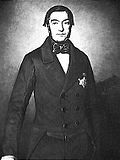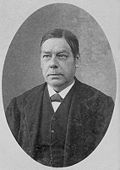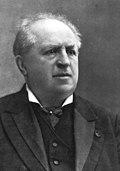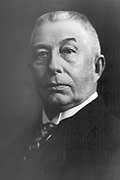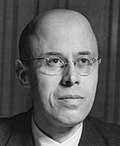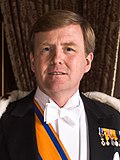Name(born and died) Portrait Term of office Political affiliation Cabinet Monarch(reign) Took office Left office Tenure Gerrit Schimmelpenninck (1794–1863) 25 March 17 May 53 days IndependentLiberal Schimmelpenninck Conservative Willem II (1840–1849) Jacob de Kempenaer (1793–1870) 21 November 1 November 345 days IndependentLiberal De Kempenaer— Liberal Johan Rudolph Thorbecke (1798–1872) 1 November 19 April 3 years, 169 days IndependentLiberal Thorbecke I Liberal Willem III (1849–1890) Floris Adriaan van Hall (1791–1866) 19 April 1 July 3 years, 73 days IndependentLiberal Van Hall— Conservative Justinus van der Brugghen (1804–1863) 1 July 18 March 1 year, 260 days IndependentAntirevolutionary Van der Brugghen Conservative Jan Jacob Rochussen (1797–1871) 18 March 23 February 1 year, 342 days Independent Rochussen Liberal –Conservative Floris Adriaan van Hall (1791–1866) 23 February 14 March 1 year, 19 days IndependentLiberal Van Hall—Van Heemstra Liberal –Conservative Jacob van Zuylen van Nijevelt (1816–1890) 14 March 10 November 241 days IndependentLiberal Van Zuylen van Nijevelt—Van Heemstra Liberal –Conservative Schelto van Heemstra (1807–1864) 10 November 1 February 83 days IndependentLiberal Johan Rudolph Thorbecke (1798–1872) 1 February 10 February 4 years, 9 days IndependentLiberal Thorbecke II Liberal Isaäc Dignus Fransen van de Putte (1822–1902) 10 February 1 June 111 days IndependentLiberal Fransen van de Putte Liberal Julius van Zuylen van Nijevelt (1819–1894) 1 June 4 June 2 years, 3 days Independent Van Zuylen van Nijevelt Conservative Pieter Philip van Bosse (1809–1879) 4 June 4 January 2 years, 214 days IndependentLiberal Van Bosse-Fock cabinet Liberal Johan Rudolph Thorbecke (1798–1872) 4 January 4 June 1 year, 152 days IndependentLiberal Thorbecke III Liberal Gerrit de Vries (1818–1900) 4 June 27 August 2 years, 84 days IndependentLiberal De Vries-Fransen van de Putte Liberal Jan Heemskerk (1818–1897) 27 August 3 November 3 years, 68 days Independent Heemskerk–Van Lynden van Sandenburg Conservative Jan Kappeyne van de Coppello (1822–1895) 3 November 20 August 1 year, 290 days IndependentLiberal Kappeyne van de Coppello Liberal Theo van Lynden van Sandenburg (1826–1885) 20 August 23 April 3 years, 246 days IndependentAntirevolutionary Van Lynden van Sandenburg Liberal –Conservative Jan Heemskerk (1818–1897) 23 April 21 April 4 years, 363 days Independent J. Heemskerk Liberal –Conservative Aeneas Mackay Jr. (1838–1909) 21 April 21 August 3 years, 123 days Anti-Revolutionary Party Mackay Coalition Gijsbert van Tienhoven (1841–1914) 21 August 9 May 2 years, 261 days IndependentLiberal Van Tienhoven Liberal Wilhelmina (1890–1948) Joan Röell (1844–1914) 9 May 27 July 3 years, 79 days IndependentLiberal Röell Liberal Nicolaas Pierson (1839–1909) 27 July 1 August 4 years, 5 days Liberal Union Pierson Liberal Abraham Kuyper (1837–1920) 1 August 17 August 4 years, 16 days Anti-Revolutionary Party Kuyper Coalition Theo de Meester (1851–1919) 17 August 12 February 2 years, 179 days Liberal Union De Meester Liberal Theo Heemskerk (1852–1932) 12 February 29 August 5 years, 198 days Anti-Revolutionary Party T. Heemskerk Coalition Pieter Cort van der Linden (1846–1935) 29 August 9 September 5 years, 11 days IndependentLiberal Cort van der Linden Liberal Charles Ruijs de Beerenbrouck (1873–1936) 9 September 4 August 6 years, 329 days General League of Roman Catholic Electoral Associations Ruijs de Beerenbrouck I RKSP – ARP – CHU Ruijs de Beerenbrouck II RKSP – ARP – CHU Hendrikus Colijn (1869–1944) 4 August 8 March 216 days Anti-Revolutionary Party Colijn I RKSP – ARP – CHU Dirk Jan de Geer (1870–1960) 8 March 10 August 3 years, 155 days Christian Historical Union De Geer I RKSP – ARP – CHU Charles Ruijs de Beerenbrouck (1873–1936) 10 August 26 May 3 years, 289 days Roman Catholic State Party Ruijs de Beerenbrouck III RKSP – ARP – CHU Hendrikus Colijn (1869–1944) 26 May 10 August 6 years, 76 days Anti-Revolutionary Party Colijn II , III RKSP – ARP – CHU – LSP – VDB Colijn IV , V RKSP – ARP – CHU Dirk Jan de Geer (1870–1960) 10 August 3 September 1 year, 24 days Christian Historical Union De Geer II RKSP – SDAP – ARP – CHU – VDB Pieter Sjoerds Gerbrandy (1885–1961) 3 September 25 June 4 years, 295 days Anti-Revolutionary Party Gerbrandy I RKSP – SDAP – ARP – CHU – VDB Gerbrandy II RKSP – SDAP – ARP – CHU – LSP – VDB Gerbrandy III RKSP – ARP – VDB Willem Schermerhorn (1894–1977) 25 June 3 July 1 year, 8 days Free-thinking Democratic League until 1946 Schermerhorn—Drees VDB – SDAP – KVP – ARP Labour Party from 1946 Louis Beel (1902–1977) 3 July 7 August 2 years, 35 days Catholic People's Party Beel I KVP – PvdA Willem Drees (1886–1988) 7 August 22 December 10 years, 137 days Labour Party Drees—Van Schaik PvdA – KVP – CHU – VVD Juliana (1948–1980) Drees I PvdA – KVP – CHU – VVD Drees II PvdA – KVP – ARP – CHU Drees III PvdA – KVP – ARP – CHU Louis Beel (1902–1977) 22 December 19 May 148 days Catholic People's Party Beel II KVP – ARP – CHU Jan de Quay (1901–1985) 19 May 24 July 4 years, 66 days Catholic People's Party De Quay KVP – ARP – CHU – VVD Victor Marijnen (1917–1975) 24 July 14 April 1 year, 264 days Catholic People's Party Marijnen KVP – ARP – CHU – VVD Jo Cals (1914–1971) 14 April 22 November 1 year, 222 days Catholic People's Party Cals KVP – ARP – PvdA Jelle Zijlstra (1918–2001) 22 November 5 April 134 days Anti-Revolutionary Party Zijlstra ARP – KVP Piet de Jong (1915–2016) 5 April 6 July 4 years, 92 days Catholic People's Party De Jong KVP – ARP – CHU – VVD Barend Biesheuvel (1920–2001) 6 July 11 May 1 year, 309 days Anti-Revolutionary Party Biesheuvel I ARP – KVP – CHU – VVD – DS70 Biesheuvel II ARP – KVP – CHU – VVD Joop den Uyl (1919–1987) 11 May 19 December 4 years, 222 days Labour Party Den Uyl PvdA – KVP – ARP – D66 – PPR Dries van Agt (1931–2024) 19 December 4 November 4 years, 320 days Christian Democratic Appeal Van Agt I CDA – VVD Van Agt II CDA – PvdA – D66 Beatrix (1980–2013) Van Agt III CDA – D66 Ruud Lubbers (1939–2018) 4 November 22 August 11 years, 291 days Christian Democratic Appeal Lubbers I CDA – VVD Lubbers II CDA – VVD Lubbers III CDA – PvdA Wim Kok (1938–2018) 22 August 22 July 7 years, 334 days Labour Party Kok I PvdA – VVD – D66 Kok II PvdA – VVD – D66 Jan Peter Balkenende (born 1956) 22 July 14 October 8 years, 84 days Christian Democratic Appeal Balkenende I CDA – LPF – VVD Balkenende II CDA – VVD – D66 Balkenende III CDA – VVD Balkenende IV CDA – PvdA – CU Mark Rutte (born 1967) 14 October 2 July 13 years, 262 days People's Party Rutte I VVD – CDA Rutte II VVD – PvdA Willem-Alexander (2013–present) Rutte III VVD – CDA – D66 – CU Rutte IV VVD – CDA – D66 – CU Dick Schoof (born 1957) 2 July Incumbent 1 year, 58 days Independent Schoof PVV – VVD – NSC – BBB 


